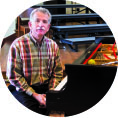Although often we may think of musical instruments as simply inanimate objects, they can get out of shape when ignored. In particular, pianos must be tuned frequently to stay pleasing to the ear. Mr. Robert Alechnowitz, Choate’s piano tuner technician, comes to campus regularly to tune all thirty of Choate’s pianos. He also works at the Neighborhood Music School in New Haven and tunes the 50 pianos there.
Mr. Alechnowitz was born in Memphis, Tennessee, but grew up in New England and has lived in Connecticut for most of his life. Mr. Alechnowitz has been studying music, particularly the piano, since he was a child.
How long have you been working at Choate?
I’ve been coming to Choate for almost 20 years. I have really enjoyed working here and have met a lot of great people.
How often do you come to campus?
I come to campus to do a general tuning every September before school starts. Then, I tune all the pianos again during spring break. I’m also here on and off to tune the pianos for special concerts and events.
How did you get involved in piano tuning?
I was a fairly serious piano student growing up. I studied piano until I was about 25 years old. I also worked as a cabinetmaker and had pretty good woodworking skills — so I combined that with my piano abilities and did an apprenticeship with a piano technician who taught me about tuning. I then joined the Piano Technicians Guild and learned even more through that organization.
What is your process for tuning pianos?
I tune completely by ear, which is called oral tuning. I was trained to do that 35 years ago when there was none of today’s advanced technology. In terms of the tuning process, there are several steps. First, I have to equalize the overall pitch of the instrument to make sure it is close to A440, the standard pitch that we use for tuning most modern instruments. Then, I tune all of the intervals and all of the unisons.
On average, this takes me about an hour and a half to two hours. I also do piano voicing — a process of working on the hammers to affect how resilient they are as well as how much tone or energy that puts into the strings.
When you’re not tuning pianos, what do you like to do?
I still work as a pianist, and I’m a member of a piano performance class at the Neighborhood Music School in New Haven. It’s a small group of adult pianists, and we practice together each week. I have also been building a concert harpsichord and a clavichord from parts produced by the Zuckermann Harpsichord Company. They sell kits with the unassembled parts, so I’ve been working on that for the past three or four years. They are almost complete at this point. When I have free time, I’m also an avid gardener.





